'Learning Irish for my film helped with cancer recovery'
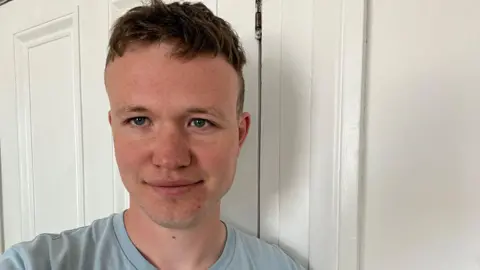 Éanna Mac Cana
Éanna Mac CanaA Belfast filmmaker has said learning Irish for a documentary exploring his rare cancer allowed him to "take back control" of his illness.
Éanna Mac Cana underwent months of intensive treatment for Burkitt's lymphoma - a cancer affecting the lymphatic system - after discovering a lump at the back of his throat.
It is named after Fermanagh-born Dr Denis Burkitt, who had discovered the cause of the disease while carrying out medical work in Uganda in the 1950s.
Mr Mac Cana said he struggled to look in his mouth after treatment, but learning certain Irish pronunciations was a form of physical therapy.
"I was accessing all these different parts of my mouth and I was saying all of these specific things... and it was actually through the Irish language that I was taking control again of my actual mouth," he told BBC News NI.
Diagnosis a 'spanner in the works'
Mr Mac Cana was finishing his first year at university in Manchester in 2017 when he first discovered the lump.
"[In] first year you're kind of partying hard, going out and having fun and I thought maybe I was just burning the candle at both ends," he said.
It was only after he returned home and the lump began to bleed did a biopsy confirm his Burkitt's lymphoma diagnosis.
He began a long, intensive treatment cycle, spending the summer as an inpatient at Belfast City Hospital while undergoing chemotherapy.
"I was living this life and having a very normal university experience and then you get this spanner in the works and it changes everything," Mr Mac Cana added.
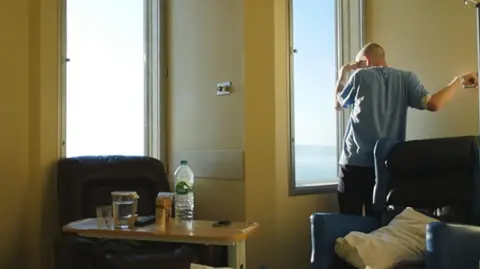 Éanna Mac Cana/Little Ease Films
Éanna Mac Cana/Little Ease FilmsAfter finishing treatment, Mr Mac Cana said it was a challenging time but wanted to use his creativity to explore his emotions, filming excerpts of his time spent in the ward.
"I really felt like at the time I was living day-to-day, I could not see beyond the next few days," he added.
"I wanted to get back to normal but the ground had changed underneath me."
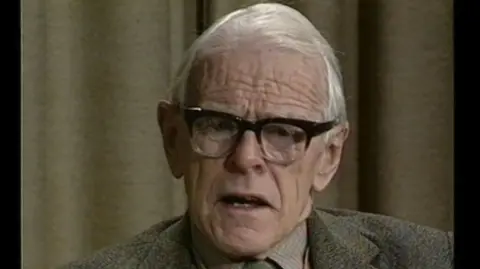 Éanna Mac Cana/Little Ease Films
Éanna Mac Cana/Little Ease FilmsWhile Mr Mac Cana was given the all-clear following treatment, the five-year wait to be fully discharged caused anxiety but in 2021, he picked up a book with a chapter dedicated to Dr Burkitt.
Dr Burkitt served with the Royal Army Medical Corps in east Africa during World War Two, and continued his medical work in Uganda after the conflict.
In 1957, he was asked to examine a boy who had tumours in his jaw, which led to Dr Burkitt travelling hundreds of miles of travel around east Africa, and the discovery that the lymphoma was driven by a viral infection.
Irish language 'a form of treatment'
After gathering archive footage of Dr Burkitt's work in Africa from his family, Mr Mac Cana began to piece together this with his own treatment clips into the feature-length documentary.
Having previously completed some projects in Irish, Mr Mac Cana took on a new challenge of re-learning the language alongside his teacher, Breandán Ó Fiach.
"After hospital I found it really difficult to look inside my mouth because the lump was back there," he said.
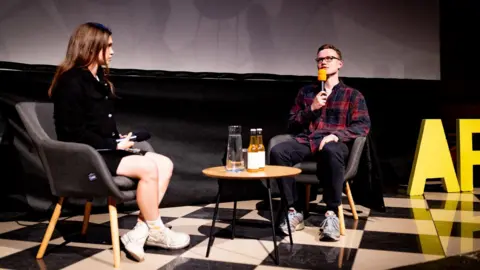 Éanna Mac Cana
Éanna Mac CanaHe found accessing parts of his mouth to be "very powerful".
"I was with Breandán one day and he was teaching about where to place certain syllables and how to access them.
"I remember saying certain words and I was using different parts of my mouth and it just felt like I was taking control of it again."
"I owe the Irish language a lot," he added.
Mr Mac Cana said he was delighted the film would add to a growing scene of films featuring the language.
"The Irish language itself is a really healing tool, it was like a form of treatment," he said.
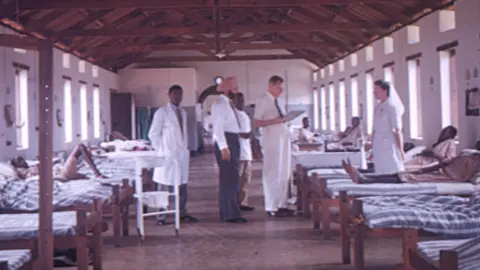 Éanna Mac Cana/Little Ease Films
Éanna Mac Cana/Little Ease FilmsDuring research for the film, Mr Mac Cana found many similarities between himself and the Burkitts.
"On the first page [of the book], it described this link between Denis Burkitt's father's bird work in County Fermanagh and how he mapped the birds inspired how Denis would map Burkitt's lymphoma across Africa," he explained.
"I had an affinity with birds because my name means bird in Irish.
"I thought it was an interesting connection and really fascinating to me that something here in Ireland could inspire something on a different continent."
Film 'remade' Burkitt family
Dr Burkitt's eldest daughter, Judy Howard, was contacted by Mr Mac Cana in 2022 and from there an "incredibly strong friendship" was formed.
"Because my dad had died back in 1993, and we've given all our emotional and physical attention to our mum then for such a long time until her death… for Éanna to arrive on our doorstep and sort of resurrect our dad with us just remade us as a family," she said.
"He feels like a part of our family."
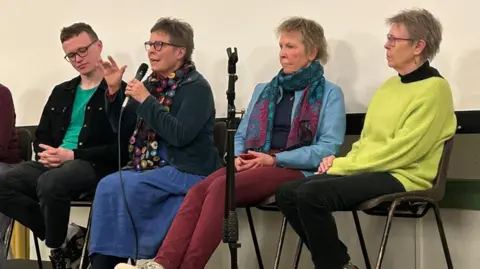 Judy Howard
Judy HowardMrs Howard and her sister Cass attended the documentary's Belfast premiere last summer, where they watched it in full for the first time.
But the most emotional moment came two months ago, when Mr Mac Cana travelled to their Gloucestershire town for a community screening.
"To see it with 50 members of our immediate family and friends from our childhood that came out of the woodwork... was just mind-blowingly extraordinary," she said.
Proud Irishman
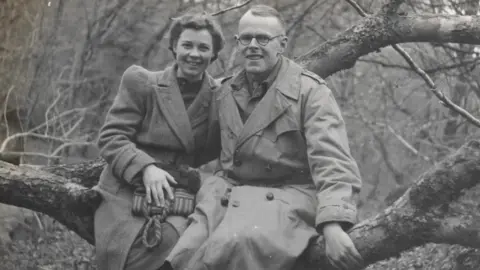 Éanna Mac Cana/Little Ease Films
Éanna Mac Cana/Little Ease FilmsWhile the film highlights Dr Burkitt's seminal work in childhood cancers, Mrs Howard said her father's research about fibre and bowels were "prophetic".
"I just hope he would be remembered primarily as an Irishman, his heart was always in Ireland," she added.
"A man of faith and integrity and always asking the question why with his twinkly eyes and soft Irish voice… he could speak truth to power as a humble, good gentleman."
Burkitt is set to air on TG4 on Wednesday 21 May at 21:30 BST.
